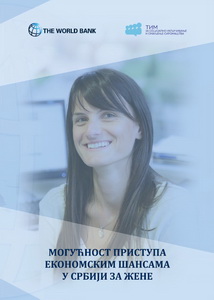 The Social Inclusion and Poverty Reduction Unit of the Government of the Republic of Serbia and the World Bank team engaged in global practices in the field of poverty have jointly developed the report “Women’s Access to Economic Opportunities in Serbia”.
The Social Inclusion and Poverty Reduction Unit of the Government of the Republic of Serbia and the World Bank team engaged in global practices in the field of poverty have jointly developed the report “Women’s Access to Economic Opportunities in Serbia”.
For more than ten years Serbia has been working and making progress in building an institutional infrastructure for gender equality, but despite this the total level of economic opportunities provided for women in Serbia remain below that for men. On average, women earn 86% of the pay earned by their male colleagues for the same work (regarding educational level and type of work). Women who have the same work profile as men have similar employment chances in the labour market; however, they face numerous obstacles in reaching the labour market. The Gender Equality Index notes that the fields where additional efforts are required for progress are the fields of labour and employment, access to financial resources and social activities (domain of time).
The report “Women’s Access to Economic Opportunities in Serbia” is primarily aimed at better understanding factors affecting economic opportunities provided for women, an area dominated by inequality. The publication deals with the options for women to succeed and become stronger in very important segments of life, such as education and health, and to participate in the labour market and provide themselves access to employment. During the review of institutions and policy measures relevant for gender equality as part of the acquisition of economic opportunities in Serbia, the intent was to indicate things that need improvement in the field of policies and programmes, to encourage the participation of women in the workplace and thus, overall, make the economy more productive. The analysis mostly relies on the use of a new set of data for Serbia, i.e. the Survey on Income and Living Conditions (SILC), as well as data from the Labour Force Survey.
Click here to download the report “Women’s Access to Economic Opportunities in Serbia”.
 Government of the Republic of Serbia
Government of the Republic of Serbia















 pdf [271 KB]
pdf [271 KB]
Leave a Comment